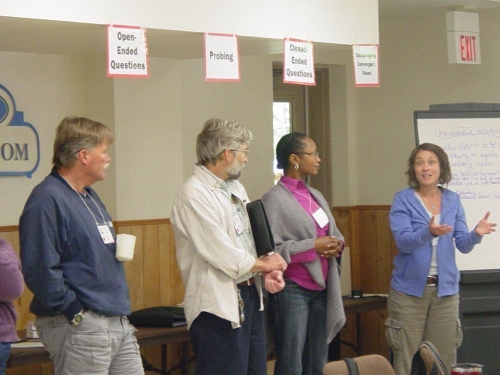Facilitative leaders build committed organizations
Michigan State University Extension's Facilitative Leadership workshop provides hands-on opportunities to learn more about how to become the kind of leader that builds and empowers groups, organizations and businesses.
 Facilitative leaders empower organizations. Imagine a decision-making environment that is socially safe. Opinions are solicited from everyone, judgment is withheld, clarification and understanding is emphasized and there is commitment to establishing consensus – something that EVERYONE can agree on - all within a clear framework of understanding. Facilitative leaders use their skills to help people better understand each other so solutions and commitment can be achieved. This is much different than the hierarchal approach of top-down leadership, where decisions are made at an administrative level.
Facilitative leaders empower organizations. Imagine a decision-making environment that is socially safe. Opinions are solicited from everyone, judgment is withheld, clarification and understanding is emphasized and there is commitment to establishing consensus – something that EVERYONE can agree on - all within a clear framework of understanding. Facilitative leaders use their skills to help people better understand each other so solutions and commitment can be achieved. This is much different than the hierarchal approach of top-down leadership, where decisions are made at an administrative level.
Facilitative leaders could also be called “team leaders.” They use a shared approach to decision-making, asking for the input and opinion of others in a positive and productive way. Using skills associated with facilitative practices, facilitative leaders are genuinely inquisitive about people’s views, encourage discussion and help groups or individuals achieve goals that would be difficult to accomplish alone.
“A facilitative leader is someone who acts on the premise that a leader does not do for others what they can do for themselves,” says Fran Rees, author of “The Facilitator Excellence Handbook.”
Based on some of Rees’ work, educators within Michigan State University (MSU) Extension offer a Facilitative Leadership workshop, which provides hands-on opportunities to learn more about this leadership philosophy. Created in 2003 for internal staff, this program has grown to encompass outside organizations, including nonprofit and government leaders who are interested in conducting more effective meetings, building a greater sense of employee ownership and seeking to build skills that generate a more committed organization.
Workshop participants experience learning activities that highlight facilitative leading. Class activities include feedback on participants’ experiences, techniques to adapt facilitation tools to a particular situation and hands-on coaching to assist with decision-making situations. All participants have the opportunity to practice facilitating within the safety of a small group setting. A notebook outlining techniques, skills, tools, and processes of facilitation is provided.
This experiential three-day workshop is scheduled for April 17 to April 19 and Sept 11 to Sept. 13. It is an intensive class that requires a participant to commit to all three days. The price includes lodging and meals. Click on a date for registration information.



 Print
Print Email
Email